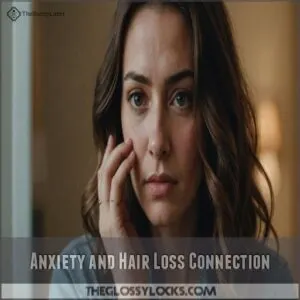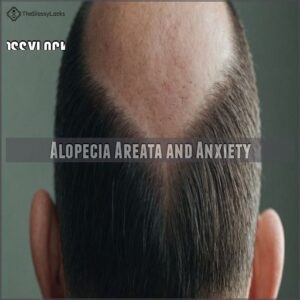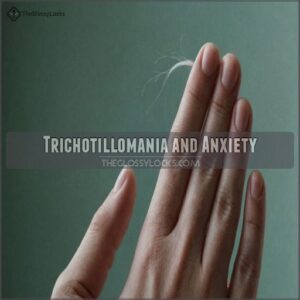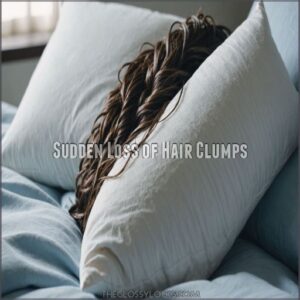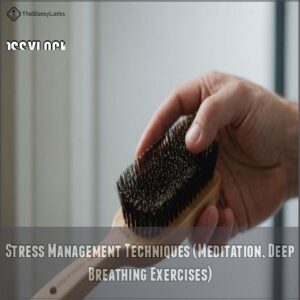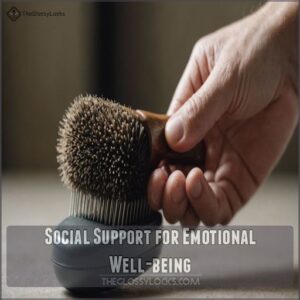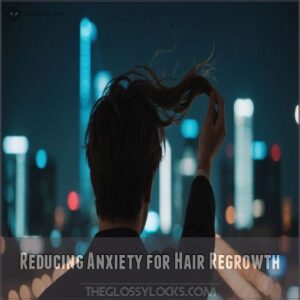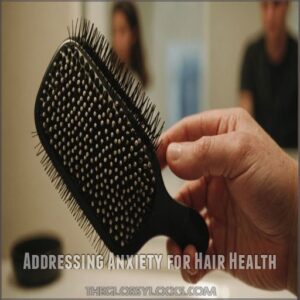This site is supported by our readers. We may earn a commission, at no cost to you, if you purchase through links.
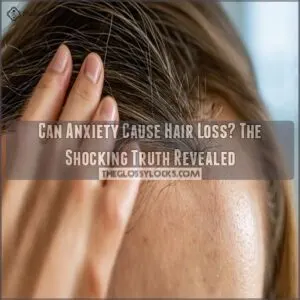 You’re not imagining things—anxiety can indeed cause hair loss.
You’re not imagining things—anxiety can indeed cause hair loss.
When stress takes the wheel, it can throw your hair growth cycle into chaos.
Think of your hair follicles as tiny drama queens, overreacting to the slightest bit of stress by taking an extended vacation.
This temporary exodus is called telogen effluvium, where your luscious locks decide to ghost you for a while.
But don’t panic! Your hair isn’t staging a permanent rebellion.
With the right stress-busting techniques, you can coax those follicles back into action.
From meditation to deep breathing, there’s a whole toolkit waiting to help you regain control and give your hair the peace it craves.
Table Of Contents
- Key Takeaways
- Anxiety and Hair Loss Connection
- Types of Hair Loss Due to Anxiety
- Managing Stress for Hair Health
- Reducing Anxiety for Hair Regrowth
- Addressing Anxiety for Hair Health
- Frequently Asked Questions (FAQs)
- Is hair loss a common anxiety disorder symptom?
- Does lack of sleep cause hair loss?
- Can anxiety cause hair loss & Balding?
- Can anxiety cause hair to fall out?
- Does stress cause hair loss?
- Can anxiety cause hair loss & telogen effluvium?
- Will stress-related hair loss grow back?
- What does hormonal hair loss look like?
- What does stress hair loss look like?
- Will hair loss from anxiety grow back?
- How do I stop my hair from falling out from anxiety?
- What does anxiety hair loss look like?
- How long does stress-induced hair loss last?
- Is anxiety-related hair loss permanent or reversible?
- How quickly can stress cause noticeable hair loss?
- Can certain hairstyles worsen anxiety-induced hair loss?
- Are there specific nutrients that combat stress-related hair loss?
- Can medication for anxiety affect hair growth patterns?
- Conclusion
Key Takeaways
- Anxiety can indeed trigger hair loss by disrupting your hair growth cycle, leading to conditions like telogen effluvium or alopecia areata.
- Stress pushes more hair follicles into the resting phase, causing increased shedding, which is often temporary and reversible with effective stress management.
- Some common strategies to manage anxiety include relaxation techniques, mindfulness meditation, and adopting a balanced diet to support healthy hair growth.
- Social support and therapy can be vital in addressing anxiety-related hair loss, as strong connections help buffer stress and promote emotional well-being.
Anxiety and Hair Loss Connection
You might be surprised to learn that your anxiety could be causing your hair to thin out.
Stress hormones can disrupt your hair’s growth cycle, pushing more follicles into the resting phase and leading to increased shedding.
How Stress Affects The Hair Growth Cycle
While your hair naturally moves through growth stages, chronic stress can throw a wrench in this delicate cycle.
Stress can lead to conditions like anxiety-related hair loss, such as alopecia areata and trichotillomania.
Your stress hormones disrupt hair follicle function, pushing more strands into the resting phase called telogen effluvium.
Think of it like a garden where too much harsh weather
Relationship Between Anxiety and Hair Loss
How often have you noticed more hair in your brush during stressful times?
You’re not imagining things – anxiety directly impacts your hair’s growth cycle.
When stress hormones spike, they can push hair follicles into their resting phase, triggering telogen effluvium.
Think of it like your body hitting pause on hair growth to deal with the stress.
But don’t worry – this relationship works both ways.
Managing anxiety often leads to healthier hair.
Types of Hair Loss Due to Anxiety
You’ll be surprised to learn that anxiety can trigger three distinct types of hair loss that affect your scalp differently.
Whether you’re dealing with sudden shedding, patchy spots, or compulsive hair pulling, understanding these types will help you take the right steps toward healthier hair.
Telogen Effluvium and Anxiety
Anxiety’s grip on your hair follicles can trigger telogen effluvium, pushing too many strands into their resting phase.
You’ll notice increased shedding about three months after a stressful event.
Don’t panic – this temporary hair loss typically resolves once you get your anxiety under control.
Focus on stress management techniques and proper nutrition to support your hair’s natural recovery process.
Alopecia Areata and Anxiety
Your immune system can sometimes feel like it’s playing a game of friendly fire, especially when stress kicks in.
With alopecia areata, anxiety acts as an autoimmune trigger, causing your body to attack its own hair follicles.
You’ll notice round, coin-sized bald patches appearing suddenly.
Don’t panic – there are effective treatment options available.
Many people find relief through stress management tips and proper medical care.
Trichotillomania and Anxiety
Stress-induced hair pulling, known as trichotillomania, can feel like an overwhelming urge you can’t control.
When anxiety strikes, you might find yourself unconsciously pulling at your hair for comfort.
Don’t face this battle alone – support groups and therapy can provide effective coping mechanisms.
Behavioral therapy, stress management techniques, and medication options have helped many break free from this challenging cycle.
Sudden Loss of Hair Clumps
Finding clumps of hair on your pillow can feel like a gut punch. Unlike compulsive hair pulling, sudden hair loss from anxiety often appears in noticeable clusters. Don’t panic – understanding what’s happening puts you back in control.
- Small clumps (quarter-sized) often signal temporary telogen effluvium
- Larger patches may indicate alopecia areata
- Consistent shedding patterns typically emerge within 3 months
- Most anxiety-related hair loss resolves with stress management
Increased Hair Loss
Many people notice increased hair shedding during periods of anxiety. It’s like your body’s hitting the panic button, disrupting normal hair growth patterns. You might spot more strands on your pillow or in the shower drain than usual.
| Trigger | Impact on Hair |
|---|---|
| Daily Stress | Gradual thinning |
| Sudden Trauma | Quick shedding |
| Chronic Anxiety | Extended loss |
Remember, this temporary setback usually resolves once you manage your stress levels effectively.
Managing Stress for Hair Health
You’ll be glad to know that you can take control of your hair health by managing your stress levels effectively.
From proven relaxation techniques to lifestyle changes that actually work, you’ll discover practical ways to keep both your stress and your strands in check.
Lifestyle Changes for Reducing Stress
You’ve got the power to turn your hair health around.
Focusing on a growth-oriented mindset can help, and you can learn more about it through a Destiny Tuning Principle.
Let’s tackle those stress triggers head-on.
Start with a healthy diet rich in hair-loving nutrients, and make regular exercise your new best friend.
Catching those Z’s matters too – aim for 7-8 hours of quality sleep.
Stress Management Techniques (Meditation, Deep Breathing Exercises)
A peaceful mind leads to healthier hair, and it’s easier than you think.
Start with five minutes of mindful meditation daily – just focus on your breath and let stress melt away.
Try progressive relaxation by tensing and releasing each muscle group, or explore guided imagery to whisk your mind to calming places.
Aromatherapy and gentle yoga can also work wonders for your anxiety levels and hair health.
Social Support for Emotional Well-being
Surrounded by understanding friends and family, you’ll discover that battling anxiety-related hair loss doesn’t have to be a solo journey.
Strong social connections act as natural stress buffers, helping to calm your nervous system and potentially slow hair loss.
Your support network matters more than you might think.
- Join a local support group where others share similar experiences
- Schedule regular coffee dates with trusted friends who’ll listen without judgment
- Consider family therapy sessions to strengthen bonds and reduce household tension
- Connect with online communities dedicated to anxiety and hair loss support
Reducing Anxiety for Hair Regrowth
You’ll be glad to know that anxiety-related hair loss can often be reversed once you get your stress levels under control.
If you’re ready to regain your hair’s health, combining stress management techniques with proper nutrition can greatly boost your chances of successful hair regrowth.
Promoting Hair Regrowth
Taking control of your hair regrowth journey starts with calming your mind.
Try natural remedies like gentle scalp massage to boost circulation and reduce stress.
Consider using products that support Vitamin D Hair Growth to further promote hair regrowth.
Combine this with hair growth supplements rich in biotin and vitamin D.
Don’t skip meals – a balanced diet packed with protein and iron works wonders for your locks.
Reversibility of Hair Loss
The good news about anxiety-related hair loss is that it’s usually temporary.
Once your stress levels come down, your natural hair growth cycle can bounce back.
Think of it like a garden that needs the right conditions to flourish.
Here’s what to expect:
- Most people see regrowth within 3-6 months
- Telogen effluvium typically resolves on its own
- Hair often grows back thicker and healthier
- Recovery speed varies with stress management
- Early intervention leads to better outcomes
Vitamin and Mineral Supplements for Hair Health
Like building blocks for healthy hair, vitamins and minerals play a key role in combating stress-related hair loss.
You’ll want to focus on biotin-rich supplements, which work wonders for hair strength, and note that the recommended daily intake is around how much biotin do I need.
Iron and zinc deficiencies can worsen anxiety-related shedding, so consider hair
Addressing Anxiety for Hair Health
You’re not alone if you’ve noticed more hair in your brush lately—anxiety might be the culprit.
Let’s explore practical ways to tackle stress and keep your locks lush, because a calmer you could mean a fuller head of hair.
Anxiety Treatment Strategies
Feeling frazzled about your frizzies? Don’t pull your hair out just yet! Tackle anxiety head-on with proven strategies.
Try Cognitive Behavioral Therapy to reframe your thoughts, or explore Mindfulness Meditation to calm your mind.
Relaxation Techniques can work wonders, while Medication Options might be your secret weapon.
Don’t go it alone – Support Groups offer a safe space to share.
Remember, addressing anxiety isn’t just good for your mind; it’s great for your mane too!
Natural Hair Loss Prevention
While battling anxiety-induced hair loss, you’ve got natural allies in your corner.
Here’s your game plan to keep those locks lush:
- Nourish from within: Load up on hair-friendly foods
- Pamper your scalp: Give yourself a relaxing scalp massage
- Harness nature’s power: Try essential oils for hair growth
- Treat your tresses: Whip up DIY hair masks
These stress-busting, hair-boosting tricks work wonders.
Remember, a calm mind often leads to healthier hair.
You’ve got this!
Separate Assessment of Anxiety and Hair Loss
Tackling anxiety and hair loss requires a two-pronged approach.
First, see a doctor to rule out underlying health issues causing your hair loss.
They’ll check your scalp and may run tests.
Next, consider using supplements specifically designed for anxiety hair loss treatment.
Next, consult a therapist to address your anxiety.
Remember, stress-related hair loss is often reversible.
By treating
Frequently Asked Questions (FAQs)
Is hair loss a common anxiety disorder symptom?
Ever felt like your worries are making your hair fall out?
You’re not alone.
Hair loss can be a symptom of anxiety disorders.
Stress triggers hormonal changes that disrupt your hair growth cycle, potentially leading to thinning or shedding.
Does lack of sleep cause hair loss?
Yes, lack of sleep can contribute to hair loss.
Your body needs rest to maintain healthy hair growth cycles.
Chronic sleep deprivation stresses your body, potentially disrupting hormone balance and nutrient absorption, which can lead to increased hair shedding.
Can anxiety cause hair loss & Balding?
Anxiety can indeed trigger hair loss and contribute to balding.
It disrupts your hair growth cycle, pushing more follicles into the resting phase.
You might notice increased shedding or thinning, but managing stress can help reverse these effects.
Can anxiety cause hair to fall out?
Like Samson losing his strength, your hair can fall victim to stress.
Anxiety triggers telogen effluvium, pushing more hairs into the resting phase.
You’ll notice increased shedding, but don’t worry – it’s often temporary and reversible with stress management.
Does stress cause hair loss?
Stress can indeed trigger hair loss.
It disrupts your hair growth cycle, pushing more follicles into the resting phase.
You might notice increased shedding or thinning.
Don’t pull your hair out worrying, though – it’s often reversible with stress management.
Can anxiety cause hair loss & telogen effluvium?
Just as a storm can ruffle feathers, anxiety can indeed trigger hair loss, including telogen effluvium.
Your body’s stress response can push hair follicles into a resting phase, leading to increased shedding.
Don’t worry, it’s often temporary.
Will stress-related hair loss grow back?
Your stress-related hair loss can grow back.
Once you manage your stress levels, your hair follicles will likely recover.
It’s not an overnight process, but with patience and self-care, you’ll see improvement.
What does hormonal hair loss look like?
Hormonal hair loss often appears as thinning at the crown and temples.
You’ll notice a widening part and receding hairline.
It’s gradual, not patchy, and affects your overall hair volume.
Don’t panic; early treatment can help.
What does stress hair loss look like?
Prepare to be shocked! Stress hair loss can look like a battlefield on your scalp.
You’ll notice thinning all over, especially at the crown.
It’s often diffuse, with more hairs in your brush or shower drain.
Will hair loss from anxiety grow back?
Yes, hair loss from anxiety can grow back.
Once you manage stress, your hair typically returns to its normal growth cycle.
It’s like hitting the reset button on your follicles.
Be patient, it may take a few months.
How do I stop my hair from falling out from anxiety?
Feeling like your hair’s jumping ship due to stress? You’re not alone.
Take control by managing your anxiety through relaxation techniques, a balanced diet, and regular exercise.
Consider talking to a therapist or doctor for personalized strategies to combat stress-induced hair loss.
What does anxiety hair loss look like?
Anxiety-induced hair loss often appears as overall thinning or diffuse shedding across your scalp.
You might notice more hair in your brush or shower drain.
In severe cases, you could develop small, circular bald patches.
How long does stress-induced hair loss last?
Around 30% of people experience temporary hair loss from stress, typically lasting three to six months.
Your hair might need about a year to fully recover.
Practicing stress management can help speed up the healing process.
Is anxiety-related hair loss permanent or reversible?
You’ve likely wondered if hair loss from anxiety sticks around forever.
Well, it doesn’t have to be permanent.
By managing stress, seeking treatment, and adopting healthy habits, you can often reverse anxiety-related hair loss.
How quickly can stress cause noticeable hair loss?
Stress can play havoc with your hair, often causing noticeable shedding within two to three months.
You might find more strands in your brush or shower, a signal to start managing stress before it worsens.
Can certain hairstyles worsen anxiety-induced hair loss?
Tight hairstyles like ponytails or braids can worsen anxiety-induced hair loss by pulling on hair follicles.
Opt for loose styles to reduce tension and protect your hair.
Treat your hair gently, as if it’s a delicate treasure.
Are there specific nutrients that combat stress-related hair loss?
Certain nutrients like vitamins B, C, and E, along with iron, zinc, and omega-3 fatty acids, can support hair health and combat stress-related hair loss.
Including them in your diet helps maintain healthy hair growth.
Can medication for anxiety affect hair growth patterns?
Some anxiety meds can, yes.
It’s a side effect, though not common for all.
Talk to your doctor; they can help you understand potential impacts and find solutions.
Don’t worry, you’ve got this!
Conclusion
Could anxiety be the sneaky culprit behind your hair loss?
Absolutely, and it’s more common than you think.
Stress can wreak havoc on your hair’s growth cycle, leading to temporary shedding like telogen effluvium or even triggering conditions like alopecia areata.
But there’s hope!
By managing stress through lifestyle changes and seeking support, you can promote hair regrowth.
Remember, with the right approach, you can combat anxiety and keep your locks looking fabulous once more.

